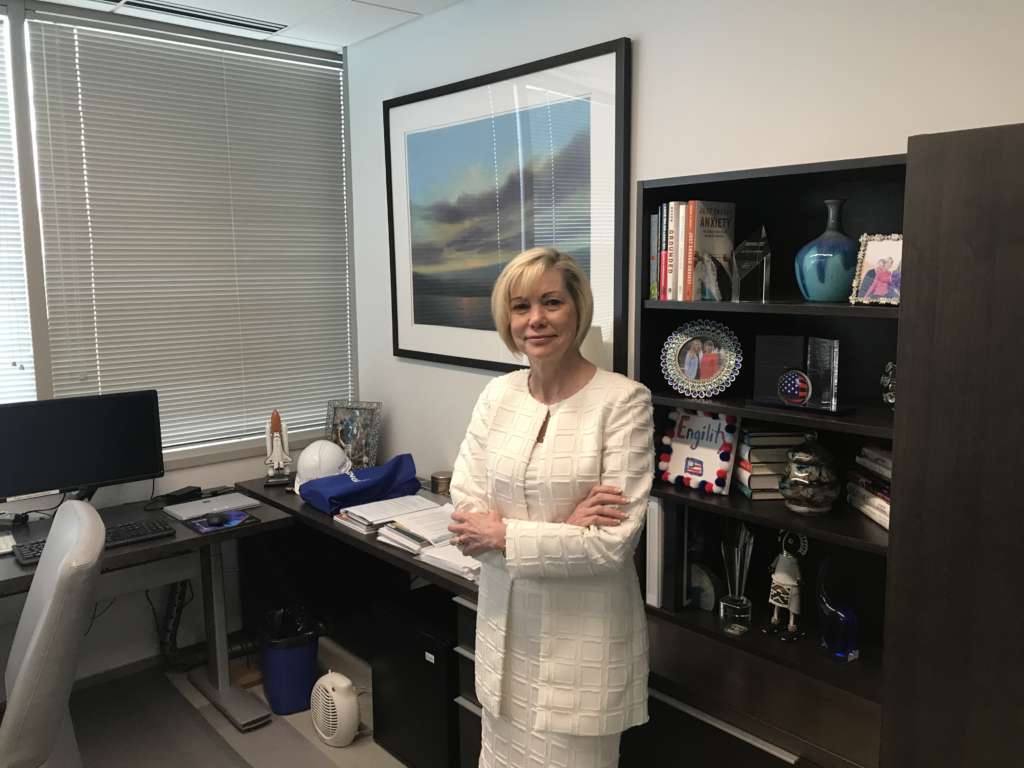
Contractors no longer operating in ‘scarcity’ mode
Lynn Dugle, the CEO, chairman and president of Engility, said the security clearance backlog is limiting their ability to bid on contracts and creating a challenge...
Views from the Corner Office is a new show designed to talk to the private sector leaders that influence and impact the federal market. The goal of this monthly discussion is for federal executives, lawmakers and other industry experts to gain insights and a better understanding into the trends, the challenges and the evaluation of the technology, acquisition and leadership in the federal market by the executives who lead the federal practices of government contractors.
Lynn Dugle, the CEO, chairman and president of Engility, sat down with Federal News Network’s Executive Editor Jason Miller at her office in Chantilly, Virginia.

Here are some excerpts from that discussion.
State of the Federal Market
JM: Is it a good time to be a federal contractor?
LD: It absolutely is a good time to be a federal contractor. Our budgets are higher than they’ve ever been before. What I think is more interesting is that we really see agencies, Defense Department, commercial technologies, small businesses, large businesses, all converging around the fact that there is space for everyone at this table because our adversary is large and they are investing big, so not only more money but much more of a unified strategy.
It’s what our grandmothers told us, right? When the water rises, all boats float. So there’s this natural ease in the market. I think it allows you to reapportion the time you spend on protecting and defending current business versus really looking beyond the horizon and seeing what’s coming at you. It also drives a different behavior in the customer set themselves for really two reasons: One is they’re able to do new programs versus trying to cut what they already have or repurpose dollars. Second, as an industry, we’ve done a disservice with the amount of protests and part of that behavior, that bad behavior, I think was the genesis of that really was not enough pie for everybody. So we were all trying to divvy up a smaller set of opportunities. So I’m hopeful that we’ll return to the cadence. If something was egregious or obviously wrong then certainly a protest would be appropriate, but not to the extent that we see them used today.
JM: Protect and defend is a great analogy because we’ve seen that too often where if an incumbent loses they press on. Is that still the case or with budget certainty, there is a change in mentality?
LD: Well, I think there’s just more opportunities. So all of us mentally, if we’re operating in the scarcity mode, where there is not enough for everybody or the abundance mode, it’s very different behaviors. We haven’t really seen a change until just the last few months. So as you look at the government cycle, by the time you authorize, appropriate and go through all of that, even at the highest levels when you’ve got that $733 billion or $700 billion or whatever that number is, by the time that then flows through to the various services, the agencies, if you’re doing new programming, you have to go through a whole process of defining requirements, doing perhaps a request for information or a request for proposal. So by the time the money hits you’ve really got that lag factor in there. So I think as we’ve looked at the industry, I’m coming out of third quarter, there’s been ups and downs on book-to-bills depending on companies in the federal services market, you saw book-to-bills well over one as we saw that money start to flow.
Speed and agility in acquisitions
JM: As a big company, who is considered a usual suspect, a typical government contractor, what’s your takes on the government’s desire to be more innovative and agile and the move to use Other Transaction Authorities (OTAs)?
LD: I love anything that can move quicker. I’m kind of a speed junkie in that sense. OTAs do have a place, but they’re not a panacea for everything. And so when you hear [former DoD Secretary] Gen. [James] Mattis talk, I think there’s a lot of common sense. Every tool should be applied to the problem as appropriate. If you’re doing a next generation bomber, there are things that take more time, need more thorough design. There are other things that can move quite quickly. In the service industry, I think we are one of those areas that could certainly move quicker. So really reevaluating OTAs give us a lighter load, a shorter cycle, the proposals don’t tend to be as intense. Normally on a large effort, you can be doing hundreds and hundreds of pages, costs, tables, resume submittal so OTAs, broad agency announcements, indefinite delivery, indefinite quantity contracts, all of them work when applied correctly. None of them are the complete answer to what we have to get accomplished.
JM: That was a very politically correct answer. But I’ll do the ‘however:’ Is there frustration from your perspective as a company to whom DoD and others in the government are saying, thank you for your hard work? You can build us the next weapon, but when we want innovation, the next great technology, we don’t see you as the answer because there’s these other people in this great world of Silicon Valley. Does that frustrate you?
LD: Well, I love your question because if there was only one thing that I could change in government contracting, we need to level the playing field between commercial and federal. And so it really hurts my head and hurts my heart when I hear customers look to only Silicon Valley or MIT off-shoots for creativity and innovation, and we are stereotyped as maybe slow and stodgy, non-creative and boring. That couldn’t be further from the truth, but we operate under a completely different standard. Commercial companies don’t have Defense Contract Audit Agency (DCAA) and Defense Contract Management Agency (DCMA) audits every year. They don’t have to certify all their small business numbers. They don’t have to charge their time in six minute intervals. And so if we as a community want to go faster, do more, get ahead of whatever threat we need to get ahead of, then I’d like to see equal oversight applied to all.
The impact of the security clearance backlog
JM: When you guys get on a contractor or when you’re bidding on a contract, do you have to have a certain number of secure people that have clearances or can you say we have this many people and we know that you asked for 45 percent of those people to be secured and we have 35 percent and we can get the other 10 percent done. How does it affect you as a company?
LD: It affects us in a couple of different ways. One, it limits what you can bid on because many expect, especially in the intelligence community, you have to name the individuals. It impacts cost structure and cost to our customers because, to your point, when there’s a disequilibrium between supply and demand in the market that scarce commodity gets more pay. But my biggest concern is what we mentioned earlier is if we cannot shrink the clear time, we are never going to attract new talent into the market, especially technologists are not going to wait that long to get on board. We’re making great progress, Mr. [Charlie] Phalen from National Background Investigations Bureau (NBIB) announced [in November] that the 740,000 [security clearance backlog] is down to 629,000. We just have to keep working that trajectory to keep our talents fresh.
81 countries and counting
JM: Tell me something about yourself that maybe no one knows or at least those inside the federal community.
LD: I have a passion for traveling and I like to go to some really strange places. In the last couple of years that’s included Rwanda, Afghanistan, and I’m looking at a trip next year to Kenya. I’ve logged 81 countries so far, and I’m looking to hit at least 100.
Copyright © 2025 Federal News Network. All rights reserved. This website is not intended for users located within the European Economic Area.
Jason Miller is executive editor of Federal News Network and directs news coverage on the people, policy and programs of the federal government.
Follow @jmillerWFED





